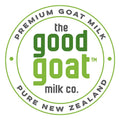How You Can Have Your Milk and Drink it too, Even if You’re Lactose Intolerant

Dairy can be the bane of your existence if you’re lactose intolerant, or if you’re suffering from a milk allergy. You’re forced to find a non-dairy alternative; and while there are plenty of other viable options for milk and cheese, sometimes they just don’t cut it from a nutritional perspective.
While you may be satisfied with a switch to soy, rice, or hemp milk—or any of the countless other plant milks available—nothing beats a cold glass of real, animal sourced, milk.
Fortunately, goat milk may be the answer to your milky woes.
First off, it’s important to know whether you are truly intolerant or allergic to milk before you make a switch. You may not be lactose intolerant, but rather, you might have a milk allergy that is triggered by the protein of a specific kind of milk.
Lactose intolerance vs. milk allergy
People who are truly lactose intolerant can’t produce lactase (an enzyme) in order to digest lactose found in most milk. This prevents absorption into the intestine; and since it can’t be broken down, this results in the bloating, gas, pain, or diarrhea associated with lactose intolerance. While goat milk contains a smaller amount of lactose than cow milk, it still has lactose which might be a problem for those genuinely lactose intolerant. However, plenty of people have switched to goat milk or cheese made from goat milk and found that they can actually enjoy dairy without the discomfort.
Milk allergies are a completely different story. For those with such an allergy, negative reactions are triggered by the protein (the alpha s1-casein protein) in different kinds of milk. Milk allergies are more common with cow’s milk because of the abundance of alpha S1 casein protein. This is why some who are lactose intolerant find that they can tolerate goat milk better, which has less of the alpha s1-casein protein. As with all allergies, consult a physician before making any dietary changes and ask about testing for milk allergies and lactose intolerance
Why goat milk can be right—even for those with lactose intolerance
Since goat milk still contains some lactose, you may be wondering how or why it could still be viable for those with lactose intolerance. The answer can be found in goat milk’s superior digestibility.
Goat milk is more easily and completely absorbed than cow’s milk. This leaves less undigested material in the intestines to ferment, which results in better overall digestion of goat milk. For that reason, lactose intolerant folks may find that their symptoms aren’t triggered as severely, or at all.
Goat milk’s digestibility has been attributed to its casein curd. These curds are softer and smaller than those found in cow’s milk. The smaller the curd, the easier it is for the human digestive system to absorb and process. When it’s easy to digest, there’s less (or no) discomfort!
Another fact that aids in the body’s ability to digest goat milk more easily is the composition and structure of its fat content. The average size of fat globules in goat milk (2 micrometers) are smaller than those found in cow’s milk (2.5-3.5 micrometers), explaining how the body can absorb goat milk so readily.
The essential differences between goat and cow milk
There are some key takeaways to remember when it comes to how goat and cow milk differ from one another.
By comparison, goat milk contains curds/fat with a smaller structure and composition, allowing them to be more easily digested than cow’s milk. The protein composition is also very different: goat milk contains anywhere from 33-66% less of the alpha s1-casein protein than cow’s milk. Since the alpha s1-casein protein is what triggers reactions in those with an intolerance or allergy, goat milk is a natural, safer alternative. Goat’s milk also contains ~10% less lactose than cow’s milk, making it easier to digest and handle if you are actually lactose intolerant.
If you thought your days of drinking a tall glass of real milk were over, think again. Unless you have a verified allergy to goat milk, you can probably try it in small amounts first to test your body’s reaction to it. Otherwise, goat milk is an easily digested alternative to milk that’s shown to produce fewer side effects than cow’s milk. We all want to grow up big and strong, so put down that plant milk and give goat milk a try.
